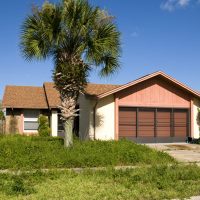Vacancy Provisions In Florida Homeowners Insurance Policies: What They Are And What They Could Mean For You

Did you know that if something happens to your property while it is vacant or unoccupied, your insurance company might not cover your property damage claim? This can happen if your insurance policy has a clause known as a “vacancy provision”.
An insurance policy’s vacancy provision can prevent recovery on a claim if your property was found to be vacant or unoccupied for a certain period of time noted in your policy. (Generally, these periods range from 30 to 60 days.) Further, the policy’s terms might limit recovery only to certain perils specifically noted.
Under a typical Florida homeowners policy:
- “Vacant” means the property lacks necessary amenities, utilities, and furnishings to permit occupancy in the residence. For example, the electricity or water have been shut off, or the house is left empty with no furniture or personal property left behind.
- “Unoccupied”, for insurance purposes, means the property is not being used by anybody as a residence. It does not necessarily mean the home is vacant, however – an unoccupied home may still have its utilities running and furnishings and appliances inside. A house is unoccupied when someone is on vacation for a week, for example. It is also unoccupied when someone leaves the home for an indefinite period, even though it has the proper amenities and utilities to be suitable as a residence.
Of course, vacancy provisions don’t normally apply to vacation homes or second homes, as long as your insurer is aware of its intended use. Some homeowners will purchase vacant or unoccupied home insurance as an add-on to their existing policy – if they anticipate a need for it.
Most vacancy provisions in standard homeowners’ policies recognize that people will leave their property for personal or business needs for extended periods – sometimes a month or two.
However, there may be unexpected situations where a home becomes “vacant” or “unoccupied” and a vacancy provision could create issues with an insurance claim.
For example:
- The homeowner falls ill or is required to enter an assisted living facility. Typically an issue with older Floridians, medical situations can arise when a person needs to check into a hospital or rehab facility for treatment. Sometimes this turns into an open-ended stay in assisted living or a skilled nursing facility. Family members looking after their loved one might not know whether or not their homeowner’s insurance included any vacancy provisions. If something happens to the property while the homeowner is receiving care elsewhere, issues including denial of an insurance claim could happen.
- A homeowner purchases a new home and leaves their other home behind while it remains for sale. Depending on how long the home remains on the market, unoccupied or vacant, this could trigger insurance headaches if an accident or emergency does arise.
Insurance companies are usually wary of properties that are left unattended, as they can be more susceptible to theft, vandalism, fire, flooding, or other issues. Without a homeowner in the property to “stand guard”, an emergency or natural disaster can be made worse.
Further, insurance companies will not hesitate to reduce, delay, or deny insurance claims where they can point to a vacancy provision that protects their interests. Sometimes, they will cite this even if the home was not truly unoccupied or vacant.
When problems arise, it always helps to contact a Florida property damage attorney that has dealt with these issues before. Whether the insurance claim is in its early stages or later, an attorney can help review your situation and determine what steps – including litigation – might be needed.
Our Daytona, Florida Property Damage Attorneys Will Make Your Voice Heard When an Insurer Disputes Your Claim
The Daytona property damage attorneys at Bundza & Rodriguez, P.A., understand the ins and outs of insurance practices, and when they may rely on a vacancy provision to try denying claims. When this happens, the insured homeowner may need expert legal help to make their voices heard. To discuss your legal options, call our Daytona law offices today at 386-252-5170, or schedule a consultation with our Daytona Beach property damage attorneys online.
Source:
businessinsider.com/personal-finance/do-you-need-unoccupied-vacant-home-insurance

